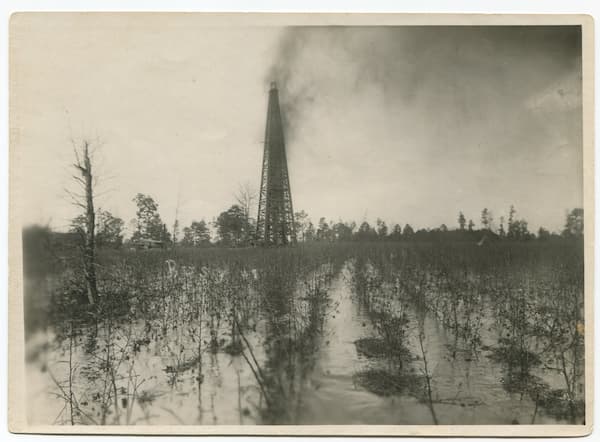Arkansas Mineral Rights
Learn about mineral rights in Arkansas, including the best counties, how to find your wells on a map, valuations, transferring ownership, paying taxes, and more.
Sell Your Mineral Rights (Request an Offer):
Arkansas Mineral Rights
WV ranks #19 in the United States natural oil production and #12 for natural gas production.
Top Producing Oil & Gas Counties in Arkansas
25Arkansas has 75 counties, and 18 of them produce some amount of oil and gas. However, the vast majority of gas is extracted from just 4 counties. Is your county one of them?
Value of Arkansas Mineral Rights
The value of mineral rights in Arkansas depends on a variety of factors, including location, production status, decimal interest, production volume, commodity price, lease development, lease terms, and the operator.
How to Locate Your Arkansas Mineral Rights
Most states have interactive maps that help mineral owners find their wells. However, Arkansas produces very little oil and gas relative to other states, so it’s not surprising that they do not have an interactive map.
Transferring Ownership of Arkansas Mineral Rights
It’s best to have an attorney help you transfer the ownership of AR mineral rights. Learn why.
Find Your AR Mineral Deed
Looking for proof that you own mineral rights? Follow these steps to search the deed records.
Sell Your Arkansas Mineral Rights
Get an offer for your Arkansas mineral rights. There is no obligation to sell, and it won’t cost you anything.

Best Locations
Top Oil & Gas Producing Counties in Arkansas
Ban Vuren, White, Cleburne, and Conway are are the top natural-gas producing counties in Arkansas. Central Arkansas is responsible for the majority of the state’s gas production while the southerns counties produce oil. The oil production is minor relative to the natural gas production and both and far less than many states.
Mineral rights located in the central and southern part of the state have the most prolific wells, and therefore, the most value. However, we will buy minerals anywhere in Arkansas as long as they have producing wells.
These are the top-producing counties:
|
|
NOTE: It is important to realize that, even in the top counties, there are areas of the county that produce more natural gas than others (and some produce none at all). The location is very so important!
Production by County
Top Producing AR Counties
Arkansas produces very little natural gas relative to other states, such as Texas, New Mexico, Ohio, West Virginia, and many more. However, it still produces enough to contribute to the overall energy production in the United States.
Van Buren County
Van Buren County ranks #1 in Arkansas gas production and #197 nationwide. Natural gas production peaked in 2014 and has since been declining. Five companies operate the state’s 1,900 wells.
White County
White County ranks #2 in Arkansas gas production and #207 nationwide. Natural gas production peaked in 2011 and has since been declining. Five companies operate the state’s 1,600 wells.
Cleburne County
Cleburne County ranks #3 in Arkansas gas production and #213 nationwide. Natural gas production peaked in 2014 and has since been declining. Three companies operate the state’s 1,300 wells.
Conway County
Conway County ranks #4 in Arkansas gas production and #214 nationwide. Natural gas production peaked in 2014 and has since been declining. Three companies operate the state’s 1,500 wells.
Image Description: Natural gas production in Arkansas’ top producing counties (data via ShaleXP).
Value Snapshot
Arkansas Mineral Rights Value
Arkansas’s oil and gas royalties and mineral rights are valued differently if they are producing vs. non-producing.
Producing Mineral Rights Value
Producing minerals are mineral rights with an active oil or gas well producing economically viable quantities of oil or gas. Mineral owners with producing wells, receive royalty checks.
Modern Valuation Method
Modern valuation methods use data from royalty statements and public data sources to model future revenue based on recent and predicted future pricing scenarios. This method considers your decimal interest, production volumes, declined curves, deductions, and commodity prices. Most mineral buyers use this valuation method.
In the past, they used to use the Rule of Thumb, which is roughly 30 – 60 months of royalty revenue based on a variety of factors. The valuation will typically be on the lower side since Arkansas is not a premier oil and gas-producing state.
Non-Producing Mineral Rights Value
Non-producing minerals do not have a producing oil or gas well. Because there are no wells, there will be no royalty revenue.
Typically, non-producing minerals are valued based on a multiple of the expected lease bonus.
For example, if the going lease bonus in the county ranges from $25-$150, you can expect to sell your mineral rights for the lease bonus times the number of net mineral acres (NMA) you own.
The value of non-producing minerals is usually stated as a price per net mineral acre. The price per net mineral acre varies from state to state, county to county, and even within a county. Arkansas will have lower lease bonuses than more desirable states.
Interested in learning more about the value of your mineral rights? Check out this guide on 7 Factors That Influence the Value of Mineral Rights or this video about why Location is Everything (via YouTube).

A Guide for Mineral Owners
Transferring Ownership in Arkansas
The proper way to transfer title is by deed or court order (including probate). In some cases, Arkansas mineral rights may be transferred with an Affidavit of Heirship (AOH), which allows the next generation to get into pay status with the operator, but can cause problems down the road if the title is not “marketable”.
You always want to have a “marketable title” to your mineral rights, so it’s worth doing the transfer correctly. It’s best to consult an Arkansas oil and gas attorney and get professional advice on transferring mineral rights.
Not sure where to find an AR attorney? Google, “AR oil and gas attorney.”
I have a Deed. What next?
Once you have a legal document conveying the mineral rights to you, you’ll need to have it recorded with the county clerk (in the county where the minerals are located). A recorded deed will have the county recording stamp with either a document number or book and page reference.
You might have to have the deed recorded yourself, or it may have been done for you (by and attorney or executor of an estate). Keep a copy of this deed for your records. Part of managing your mineral rights, is having good records.
Notifying Operators
Once the conveyance document has been recorded, send a copy to each operator with a request to transfer the ownership.
Need more help (transferring before/after death, after a divorce, or into/out of a trust)? Our detailed guide to Transferring Mineral Rights may help.
An alternative to transferring ownership is to sell your Arkansas mineral rights, which may make sense if the interest is relatively small or the next generation is not interested in managing them.
Running the Title
Searching Arkansas Deed Records
It’s a good idea to keep a copy of your mineral deed (and the previous deeds) in your files. The legal descriptions in your deed will come in handy at some point in the future, and it’s so much easier to transfer ownership to the next generation when this information is easily accessible.
Fortunately, it’s easy to locate most mineral deeds and other title documents related to your mineral rights.
Google search: [County Name] + “deed search”
Example: “Van Buren County AR Deed Search”
One of the top results should take you to the county’s Register of Deeds and there will probably be a link to their online deed records.
Simply search the county records for your name and the names of the people from whom you inherited the mineral rights. Most of the time, you can search for free, and documents can be purchased for a few dollars.
You might find conveyances, deeds, assignments, affidavits of heirship, lease memos, and other relevant documents.
If you’re thinking about your estate plan, you might find our guide, Four Things Older Mineral Owners Should Consider,” to be thought-provoking.
Additional Tax Burden
Paying Taxes for Arkansas Mineral Rights
All Arkansas oil and gas royalty owners pay federal income taxes on their royalty revenue. The IRS allows royalty owners to deduct a 15% depletion on Federal taxes.
AR State Taxes
Royalty income is typically considered ordinary income for tax purposes. It is subject to Arkansas’ graduated income tax rate ranging from 2% to 5.99% on individual taxpayers, depending on their income level.
Property Taxes
Ad Valorem Taxes are county taxes levied on producing mineral rights. Non-producing mineral rights in Arkansas are not generally subject to property taxes.
If you don’t pay your mineral property taxes, the county will auction your mineral rights! So, be sure to keep your address current with both your operators and the counties where the mineral rights are located (even if you are on direct deposit).

Image Description: Illustration of an oil pumpjack used on conventional (vertical) oil wells.

Image Description: Oil derrick “Busey #1” located near El Dorado. Source: Arkansas State Parks.
Past and Future
History of Oil & Gas Development in Arkansas
The Smackover Boom (1920s–1930s)
Arkansas entered the national oil and gas arena in 1921 with the discovery of oil in El Dorado, Union County. This led to one of the most dramatic early oil booms in U.S. history — rivaling even Texas and Oklahoma at the time. Just two years later, the Smackover Field in southern Arkansas became one of the most prolific oil fields in the world.
Mid-Late 20th Century
During the mid-to-late 20th century, Arkansas oil and gas production declined from its early peak but remained a reliable part of the state’s economy — especially in Union, Columbia, Lafayette, and Ouachita Counties.
Fayetteville Shale Era (mid-2000s)
In the mid-2000s, Arkansas experienced a second surge with the Fayetteville Shale, a natural gas play in north-central counties including White, Van Buren, and Faulkner. Horizontal drilling and fracking led to a sharp increase in gas production, peaking around 2012.
Modern History & Outlook
Since 2013, low gas prices and high drilling costs have led to a steep decline in new activity. Most large operators have exited the state, and production now comes mainly from existing wells. New drilling is rare.
How Arkansas Compares to Other States
Arkansas is no longer a major player in U.S. oil and gas, especially when compared to regions like Texas, Pennsylvania, or New Mexico. Still, many wells continue to produce, and mineral rights in legacy fields or long-lived shale wells can still hold value.
Frequently Asked Questions
Arkansas Mineral Rights FAQs
Browse these frequently asked questions about AR minerals.
How do I know if I own mineral rights in Arkansas?
There is no easy answer to this question. Each situation is different, so we need to look at your specific situation.
Let’s go over a couple of scenarios:
Ten years ago, you purchased a house with 6.7 acres of land
Most real property is sold through a standard real estate transaction, which requires a title company to review the ownership history. The title company may know if you own the mineral rights under your property. You can ask them (or it might be in your documents). If they don’t know, you can stop by the county courthouse and do a title search.
You now own the 300 acres of land that has been in your family for generations.
You may or may not own the mineral rights. In Arkansas, there is a significant chance that you own the mineral rights, but you would have to do a title search to verify the ownership. Simply visit the County Clerk to access their deed records. You’ll start with your deed and trace the land ownership back to the original land patent, then trace it forward and look for any reservations or conveyances of mineral rights. Most people do not have the skills to do this, so you may need to hire a landman or an attorney.
What happens to dormant minerals in Arkansas?
In Arkansas, the treatment of dormant mineral rights—that is, mineral rights that have not been actively mined, drilled, or otherwise used for a period of time—does not follow a uniform state-wide statute for automatic reversion to the surface owner, as seen in some other states. Instead, the approach to dormant mineral rights is largely governed by the specific terms of the mineral deed or lease and general property laws.
Key considerations for dormant mineral rights in Arkansas include:
-
No Automatic Reversion Law: Arkansas does not have a specific “dormant mineral” law that automatically reverts unused mineral rights to the surface owner after a period of inactivity. Unlike states with such statutes, in Arkansas, the ownership and control of dormant mineral rights remain with the mineral rights holder unless otherwise stipulated in the original deed or a subsequent legal agreement.
-
Statute of Limitations for Adverse Possession: While Arkansas does not have a statute specifically addressing the abandonment of mineral rights, there are general statutes of limitations that might affect claims over property, including adverse possession claims. However, claiming mineral rights through adverse possession can be complex and is less straightforward than surface rights due to the hidden nature of subsurface assets.
I just inherited mineral rights. What should I do first?
The first thing a new mineral owner needs to do is make sure the mineral rights are in your name. This process is not automatic so you may need an attorney to facilitate probate proceedings or a trustee to deed the mineral rights to you (and the other heirs).
If you have producing minerals (there are one or more wells on the property), you need to send your proof of ownership (usually a deed, divorce decree, or recorded probate documents) to the operator and ask them to transfer the ownership.
The operator will do their research, and if everything checks out, they will transfer the ownership to you. They may send a division order to make sure that both of you agree about the amount of interest you own.
Be sure you keep copies of all your mineral documents – they will come in handy later and help you effectively manage your mineral rights.
How do I sell Arkansas mineral rights?
It’s easy to sell your AR mineral rights and it doesn’t cost you anything. Here is the basic process:
1. Request an offer. We’ll need to see your latest royalty statements. If you have more documents, such as deeds or 1099s, that’s great, but don’t worry if you have limited info.
2. We will give you an offer. You can decide if you want to accept it, look for competing offers, or reject it. Requesting an offer doesn’t obligate you to sell.
3. If you want to proceed with the sale, we will do a title search and draft the closing documents.
4. We will coordinate the closing process to meet both of our schedules. It is usually done remotely, but if you are in the DFW area, we can close in-person if you want.
Image Description: Unconventional natural gas wells in part of Arkansas (via WellDatabase).
National Focus
Where We Buy Mineral Rights
We buy both producing and non-producing minerals in all oil and gas states. However, we are especially interested in Texas and Kansas mineral rights.
|
We even buy minerals in more obscure states, which produce very little oil and gas compared to other states.

Valuation Basics
How We Value Mineral Rights
There are many factors that play into the value of mineral rights. These include location, producing vs. non-producing properties, current oil and gas prices, well production figures, lease terms, and even the operator of the well or wells. We also look at the risks of buying and owning minerals that you are interested in selling.
Location
Minerals in the hottest shale plays are more valuable than those in older fields with conventional wells.
Producing vs. Non-Producing
Producing minerals are often worth more than non-producing minerals because they are generating revenue.
Oil & Gas Prices
When oil and gas prices drop, revenue drops, and sometimes operators are unable to continue operating the well.
Production
Highly productive wells (and off-set wells) can increase the value of your minerals.
Lease Terms
Favorable lease terms (such as a 25% royalty reservation) positively impact the value of the leased minerals.
Operator
A small number of operators are unethical, and their reputation automatically devalues your minerals.
Why Sell?
Why People Sell Their Mineral Rights
I am putting my affairs in order. I don’t want to burden my kids with the hassle of transferring ownership and managing small mineral rights. When my sister passed away, my niece and nephew had to hire an attorney to help them with the minerals. I don’t want my kids to go through that.
I inherited my mineral rights so they were sentimental, but I don’t really want to bother with managing them and filing extra tax returns. I decided to sell and use the money as a down payment on my house.
I had no idea how fast the oil production would decline. My checks are only 20% of what they were a few years ago. I should have sold my mineral rights when the wells were brand new and still generating huge royalties.
My oil wells have been producing for decades and the reserves are almost depleted. Once the wells are plugged, the value will be significantly lower. I’d rather cash out now.
I inherited mineral rights, but don’t want to be involved with fracking and fossil fuels. I would prefer to support renewable energy and do my part to reverse climate change.



